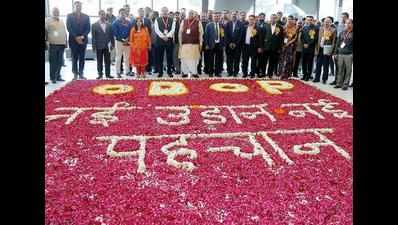- News
- City News
- lucknow News
- ODOP offers strong foundation for a confident, self-reliant UP
Trending
This story is from March 18, 2021
ODOP offers strong foundation for a confident, self-reliant UP
Prime Minister Narendra Modi rightly described the One District One Product (ODOP) of Chief Minister Yogi Adityanath as an “extension of Make in India” programme. Like ‘Make In India’ which intends to make India self-reliant, ODOP seeks to make UP self-reliant. Today, the novel initiative of Yogi Adityanath has provided a strong foundation for a self-dependent, confident UP.It has proved to be an immensely successful multi-pronged strategy of the UP government aimed at restoring and conserving dying symbols and traditions of places, uplifting artisans engaged in the making of those products, generating employments and boosting economy by promoting the Micro, Small and Medium Enterprises (MSME) and investments in this sector.
Since the launch of the ODOP scheme in 2018, the economy of the state has got a boost while products, some of which were on the verge of extinction due to neglect by previous governments, have got a fresh lease of life. Some of the popular products of certain districts including Kalanamak rice of Siddharthnagar, terracotta of Gorakhpur and chikankari (chikan embroidery) of Lucknow have got the much needed impetus under Yogi Government’s unique ODOP scheme.
The Yogi government has successfully achieved its vision behind ODOP -- generating millions of job opportunities for the youth and promoting the MSME sector. It has also helped empower artisans and poor workers engaged in the industry. Besides, the unique heritage of Uttar Pradesh has got an impetus and a global platform under this unique scheme.
Since online shopping is the new trend in society, the Yogi Government has also signed MoUs with Amazon India, Flipkart and eBay.com to promote sale of traditional products. According to these agreements, all artisans, weavers and craftsmen associated with ODOP scheme would be connected to the international market through these online market platforms. It is worth mentioning here that these handmade products are in great demand in overseas markets, especially in the US, the UK and Australia.
Amazon India is supporting MSME entrepreneurs in nine districts of UP as part of the ODOP scheme. Amazon’s 'Kala Haat' programme has provided a global market for Banarasi silk saree, Bhadohi's carpets, Lucknow's chikankari, Kanpur's leather goods, Agra's leather footwear, Aligarh's locks, Moradabad's bronze items, Meerut's sports goods and Saharanpur's wood products.
Amazon India has connected these MSMEs to crores of buyers from across the country and abroad and has supported traditional industries. Amazon is providing training, account management guidance, marketing tools, world-class warehouses for warehousing and delivery networks to these entrepreneurs. Besides, buying and selling products related to ODOP are also being done through the online platform ‘ODOP Mart Dotcom’ created by the Government.
Meanwhile, the Yogi government is now eyeing the big craft markets in the US and Europe. The government is planning to carve a market for ODOP products in the fashion world through superior design. Dr APJ Abdul Kalam Technical University (AKTU) and National Institute of Fashion Technology (NIFT) have signed MoUs with the MSME department in this regard.
AKTU is set to introduce a course on the art of selling ODOP products in the market whereas NIFT will specially design clothes, carpets, leather industry products and other items covered under ODOP keeping in mind the characteristic geographical aspects of the markets, the popular colour, material and quality. According to the agreement, the products will be designed as per the demand of the US and European markets as well as the big markets within India such as Mumbai, Delhi and Kolkata.
The Central and state governments are consistently rolling out schemes to boost the MSME sector. Due to such efforts, UP has emerged as the second largest economy of the country in the recent past and no wonder if it becomes the top economy in the coming years.
The government has started branding industries associated with traditional food products to provide impetus to them. Taking special interest in this scheme, the CM has urged all eminent artists, public representatives and officers to promote the traditional ODOP food products and artefacts. The government also plans to promote the famous gooseberry of Pratapgarh, Fatehpur and Rae Bareli; mango of Lucknow and Malihabad; Surkha Guava of Kaushambi and Prayag; banana of Gonda, Bahraich, Lakhimpur and Shravasti; and jaggery of Muzaffarnagar, Ayodhya, Baghpat, Bijnor, Shamli and Meerut in this context.
There are many such products which have been integral to the identity of the districts that are getting due promotion under the Yogi Government. These include Mainpuri’s garlic, green chilly of Varanasi and Deoria; Hathras’ asafoetida and the ghee of Auraiya or Kasganj.
All relevant information related to the ODOP are available online. The Udyam Sarathi app has been launched by the government as an important link to help aspiring entrepreneurs set up units. By applying on this portal, artisans and craftsmen of the state can get information about the schemes of the Central and State governments, banking facilities and the ODOP programme at large. ODOP has also contributed towards empowering women of the state and making them self-reliant.
(The writer is an economist. Views expressed here are personal)
Since the launch of the ODOP scheme in 2018, the economy of the state has got a boost while products, some of which were on the verge of extinction due to neglect by previous governments, have got a fresh lease of life. Some of the popular products of certain districts including Kalanamak rice of Siddharthnagar, terracotta of Gorakhpur and chikankari (chikan embroidery) of Lucknow have got the much needed impetus under Yogi Government’s unique ODOP scheme.
The Yogi government has successfully achieved its vision behind ODOP -- generating millions of job opportunities for the youth and promoting the MSME sector. It has also helped empower artisans and poor workers engaged in the industry. Besides, the unique heritage of Uttar Pradesh has got an impetus and a global platform under this unique scheme.
Since online shopping is the new trend in society, the Yogi Government has also signed MoUs with Amazon India, Flipkart and eBay.com to promote sale of traditional products. According to these agreements, all artisans, weavers and craftsmen associated with ODOP scheme would be connected to the international market through these online market platforms. It is worth mentioning here that these handmade products are in great demand in overseas markets, especially in the US, the UK and Australia.
The agreement gives the under-served communities of Uttar Pradesh an opportunity to showcase their distinctive products and crafts to millions of consumers within the country and abroad. Also, these e-commerce companies are providing free cataloguing, marketing, account management, business information and warehousing support to the artisans associated with these platforms. Flipkart had earlier also signed an agreement with the Uttar Pradesh Khadi and Village Industries Board to benefit weavers and artisans by introducing Khadi textiles and village industries products on its site. Garments with traditional chikankari and zardozi embroidery are available on the Flipkart platform.
Amazon India is supporting MSME entrepreneurs in nine districts of UP as part of the ODOP scheme. Amazon’s 'Kala Haat' programme has provided a global market for Banarasi silk saree, Bhadohi's carpets, Lucknow's chikankari, Kanpur's leather goods, Agra's leather footwear, Aligarh's locks, Moradabad's bronze items, Meerut's sports goods and Saharanpur's wood products.
Amazon India has connected these MSMEs to crores of buyers from across the country and abroad and has supported traditional industries. Amazon is providing training, account management guidance, marketing tools, world-class warehouses for warehousing and delivery networks to these entrepreneurs. Besides, buying and selling products related to ODOP are also being done through the online platform ‘ODOP Mart Dotcom’ created by the Government.
Meanwhile, the Yogi government is now eyeing the big craft markets in the US and Europe. The government is planning to carve a market for ODOP products in the fashion world through superior design. Dr APJ Abdul Kalam Technical University (AKTU) and National Institute of Fashion Technology (NIFT) have signed MoUs with the MSME department in this regard.
AKTU is set to introduce a course on the art of selling ODOP products in the market whereas NIFT will specially design clothes, carpets, leather industry products and other items covered under ODOP keeping in mind the characteristic geographical aspects of the markets, the popular colour, material and quality. According to the agreement, the products will be designed as per the demand of the US and European markets as well as the big markets within India such as Mumbai, Delhi and Kolkata.
The Central and state governments are consistently rolling out schemes to boost the MSME sector. Due to such efforts, UP has emerged as the second largest economy of the country in the recent past and no wonder if it becomes the top economy in the coming years.
The government has started branding industries associated with traditional food products to provide impetus to them. Taking special interest in this scheme, the CM has urged all eminent artists, public representatives and officers to promote the traditional ODOP food products and artefacts. The government also plans to promote the famous gooseberry of Pratapgarh, Fatehpur and Rae Bareli; mango of Lucknow and Malihabad; Surkha Guava of Kaushambi and Prayag; banana of Gonda, Bahraich, Lakhimpur and Shravasti; and jaggery of Muzaffarnagar, Ayodhya, Baghpat, Bijnor, Shamli and Meerut in this context.
There are many such products which have been integral to the identity of the districts that are getting due promotion under the Yogi Government. These include Mainpuri’s garlic, green chilly of Varanasi and Deoria; Hathras’ asafoetida and the ghee of Auraiya or Kasganj.
All relevant information related to the ODOP are available online. The Udyam Sarathi app has been launched by the government as an important link to help aspiring entrepreneurs set up units. By applying on this portal, artisans and craftsmen of the state can get information about the schemes of the Central and State governments, banking facilities and the ODOP programme at large. ODOP has also contributed towards empowering women of the state and making them self-reliant.
(The writer is an economist. Views expressed here are personal)
End of Article
FOLLOW US ON SOCIAL MEDIA












